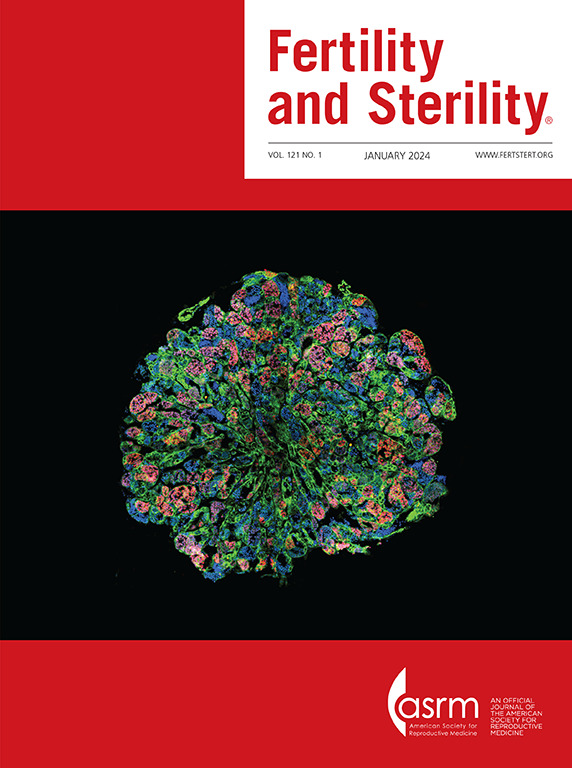针对 LGBTQ+ 家庭的治疗性人工授精:系统性综述。
IF 6.6
1区 医学
Q1 OBSTETRICS & GYNECOLOGY
引用次数: 0
摘要
重要性:女同性恋、男同性恋、双性恋、跨性别者和同性恋+(LGBTQ+)家庭应该在为满足其独特需求而设计的环境中获得循证医疗服务;然而,据报道,不孕不育诊所提供的医疗服务并不完善,尤其是对于接受治疗性供精人工授精(TDI)的出生时即被指定为女性的患者:目的:确定常规不孕不育护理中哪些方面适合这一特殊患者群体,特别是那些希望通过捐献精子怀孕的患者。提出的研究问题是:"关于LGBTQ+家庭的TDI护理,哪些筛查和治疗方案得到了证据的支持?针对和/或在辅助生殖治疗中包括这一患者群体的高质量前瞻性研究有限,但我们发现了有关年龄预后、筛查指南、治疗结果、人工授精时机、每个周期人工授精次数、何时转诊以及手术安全性等方面的证据:研究结果表明,与常规不孕不育治疗方案相比,针对不排卵的 LGBTQ+ 人士的低技术、低干预治疗模式具有相同或更高的成功率,且不会增加风险:鉴于目前的证据,LGBTQ+家庭在获得支持和培训的情况下,可以在各种环境下(包括社区和初级医疗机构以及不孕不育诊所)提供适当的TDI:本综述确定了支持为 LGBTQ+ 家庭提供 TDI 的现有证据,扩大了受助者及其护理提供者获得护理的机会,并概述了有待进一步研究的领域。本文章由计算机程序翻译,如有差异,请以英文原文为准。
Therapeutic donor insemination for LGBTQ+ families: a systematic review
Importance
Lesbian, gay, bisexual, transgender, and queer+ (LGBTQ+) families deserve evidence-based care within environments designed for their unique needs; however, care provided in fertility clinics has been reported to fall short, most notably for assigned female at birth recipients of therapeutic donor insemination (TDI).
Objective
To identify the aspects of routine infertility care that are clinically appropriate for this unique patient population, specifically those seeking pregnancy with donor sperm. The research question was posed, “What screening and treatment protocols are supported by the evidence regarding TDI care for LGBTQ+ families?”
Evidence Review
High quality, prospective studies specific to and/or inclusive of this patient population in assisted reproductive care contexts is limited, however evidence regarding age-informed prognosis, screening guidelines, treatment outcomes, insemination timing, number of inseminations per cycle, when to refer, and safety of the procedure were found.
Findings
Findings indicate that compared with routine infertility care protocols, a low-tech, low-intervention model of care for ovulatory LGBTQ+ individuals renders equal or higher success rates without increasing risk.
Conclusion
Given the current evidence, TDI for LGBTQ+ families can, with support and training, be provided appropriately in a variety of contexts, including community-based and primary care settings as well as in fertility clinics.
Relevance
This review establishes the current state of the evidence supporting TDI for LGBTQ+ families, expanding access to care for recipients as well as their care providers and outlining areas for further study.
求助全文
通过发布文献求助,成功后即可免费获取论文全文。
去求助
来源期刊

Fertility and sterility
医学-妇产科学
CiteScore
11.30
自引率
6.00%
发文量
1446
审稿时长
31 days
期刊介绍:
Fertility and Sterility® is an international journal for obstetricians, gynecologists, reproductive endocrinologists, urologists, basic scientists and others who treat and investigate problems of infertility and human reproductive disorders. The journal publishes juried original scientific articles in clinical and laboratory research relevant to reproductive endocrinology, urology, andrology, physiology, immunology, genetics, contraception, and menopause. Fertility and Sterility® encourages and supports meaningful basic and clinical research, and facilitates and promotes excellence in professional education, in the field of reproductive medicine.
 求助内容:
求助内容: 应助结果提醒方式:
应助结果提醒方式:


